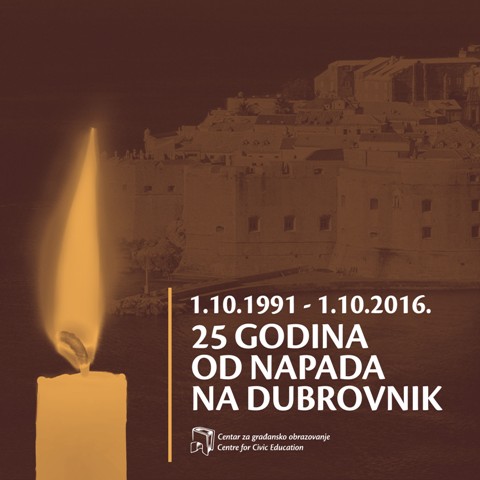Centre for Civic Education (CCE) reminds that 25 years ago – on 1 October 1991 – began the attack on Dubrovnik by the members of Yugoslav People’s Army (YPA) from the territory of Montenegro, which resulted in high number of victims and material devastation. On this occasion, CCE once again calls the Supreme State Prosecution of Montenegro to investigate so far collected evidence, as well as to make greater effort and find further evidence in order to determine the facts and prosecute the people responsible. The Prosecution assumed this obligation by the Strategy on the investigation of war crimes, adopted in May 2015.
As a reminder, citizens of Dubrovnik lived under both land and naval blockade for 240 days, 138 days without the electricity and water, while they lived more than four months in shelters. YPA destroyed village after village in the area of Konavle, Župa Dubrovačka, and coastal area in the vicinity of Dubrovnik, thereby devastating, pillaging and burning civilian objects. Part of the population fled to Dubrovnik, northern Dalmatia and isles, while the majority of older residents remained in villages, many of whom were killed or taken to YPA’s camps in Morinj in Montenegro or to in Bileći B&H. As a result of war, 116 civilians died in Dubrovnik area, 194 Croatian defenders died, 165 Montenegrin members of YPA died, 443 persons were imprisoned in camps in Morinj and Bileća, 33 000 persons were persecuted and 2,071 residential buildings were destroyed.
“It was a great misunderstanding which unfortunately had a bloody epilogue”, explanation of one of the high officials of then Montenegrin government, whose party still rules in Montenegro. Precisely such approach resulted in no discovery of either command, or political responsibility, even 25 years from the beginning of the attack. The Government in Montenegro was never brought to question due to the intervention in Dubrovnik. Unfortunately, it remained the creator of public policies, even of educational policies which tend to completely neglect this crime.
In its publication “What Montenegrin textbooks conceal and reveal on the contemporary history of Montenegro” CCE determined that history textbooks in Montenegro systematically cancel out that period and the events that followed, all of which could potentially raise the issue of responsibility of many who were, and who still make the ruling structure. “Reservists from Montenegro participated in the attack of YPA on Dubrovnik region” – it is the single sentence which new generations can learn through formal system of education from the official textbooks. Consequently, nearly two thirds of interviewed students did not know the year of armed intervention on Dubrovnik and Dubrovnik region in general. When asked who conducted the armed intervention on Dubrovnik and Dubrovnik region in general, for which there were four options to choose from, with a possibility to choose more than one, 61.7% of students replied that the intervention was performed by Yugoslav People’s Army (YPA), 24.2% believes that it was done by members of Territorial Defence (TD) of Montenegro, 10% by the members of Ministry of Interior of Montenegro (then RSIA – Republic Secretariat for Internal Affairs), and 25% believes that the intervention was performed by the members of paramilitary formations. When asked about the reason behind the attack on Dubrovnik and Dubrovnik region in general, one third of students (33.3%) replied spontaneously by stating the following reasons: “national conflicts between Serbs and Croats, and persecution of Serbian population from the territory of Croatia”, “militarist tendencies of political leaders of Croatia and Serbia”, “conquest of Croatian territory i.e. the usurpation of Dubrovnik, the so called “war for peace”, while a significant number of them replied that they had no idea as to what caused the attack. When asked about the number of YPA soldiers from Montenegro who died on Dubrovnik battlefield, 50% of students, based on three options, replied correctly that the number was 165, 28.3% of them did not know the exact answer, and 21.7% did not provide an answer.
Such results of history teaching in Montenegro indicate that there is no political will or the professional integrity to transfer the facts from the past. Instead, history as a subject is used as an instrument for the purpose of creation of unilateral and politicised views on past, which do not contribute to reconciliation and establishment of justice for victims, which is why today we have victims and crimes, but no judicial proceedings with adequate epilogue. Attack on Dubrovnik must not be forgotten, and as a society we are ought to face that part of our past properly, and adequately include it in formal system of education.
Tamara Milaš, programme associate at CCE and spokesperson of Coalition for RECOM in Montenegro

